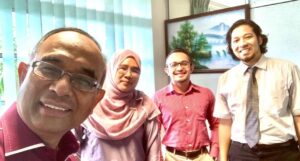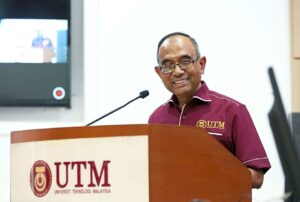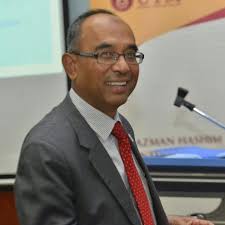
Prof Wahid, me, Lukman & Ali
Q1: Motivation to lead and the importance of quality leadership
I have always viewed our former VC, Professor Datuk Ir Dr Wahid Omar, as a people’s people leader. He has left a deep impression on me ever since he was willing to pick up my concerns about a matter related to the university, about 12 years ago. Meeting him in person again after those years and the chance to personally interview him, has confirmed my impression of him. To the question of ‘What motivates you to lead?, he had shared with us seven (7) principles of his. The principles, according to him, are of accountability, trust, responsibility, credibility, punctuality, risk-taker and the delivery of responsibility. He truly believes that leading others is a responsibility to do so. From his explanation on the given questions, I have a strong understanding that his leadership’s principle is a blend of transformational leadership and servant leadership characteristics. For this set of question, transformational leadership style is the most significant style he embarks on. Punctuality is the first trait I observed, as he did show up on time for the interview. The punctuality behaviour is indeed an exemplary of quality leadership in a leader.
Transformational leadership can be understood as ‘a leader that works with teams to identify needed change, creating a vision to guide the change through inspiration, and executing the change in tandem with committed members of a group” (Business Dictionary, 2016). The traits he pointed out is similar to the 4i’s of transformational leaders’ behaviours, namely, inspirational motivation, idealized influence, intellectual stimulation, individualized consideration. Inspirational motivation behaviour is closely similar to him as Datuk strongly emphasized on setting high standard about being accountable, credible, responsible and being punctual. He kept on mentioning that, to lead others, these principles are the underlying behaviours that he has always follows and that he expected others to follow suit. Datuk believes that to be focused on organisations’ goal, everyone must be ready to commit to the same set of principles, thus, creating a similar shared vision for the organization. Throughout the years, I have observed that, in general, he did manage to articulate these principles clearly to others.
The next ‘I’ is Idealized influence. This I agree strongly as Datuk is very particular about integrity when he mentioned about always being accountable and upholding the trust of others. The other ‘I’ is on Intellectual stimulation. Interestingly, Professor Datuk does strongly encourages his organisational leaders to think for themselves, be more creative, innovative, be more courageous and be opened to new ideas. He jokingly mentioned that he is HS (hentam sahaja) persona, as he believes in conducting risk-taking behaviour in order to push changes. This trait is also part of charismatic leadership element of taking calculated risks that oppose the status quo (Ehrhart and Klein, 2001). Thus, he strongly motivates his staff to embark on continuous learning opportunities and to remove obsolete practices. The final ‘I’ is of Individualized consideration. This behaviour, I strongly agree about him, as I had witnessed his humility act years ago. Datuk does provide his staff with a supportive resource and did allot his time to develop the potential of his staff.
From my understanding, the practice of quality leadership has been well projected by our former VC through his thinking, behaviour and actions. To the best understanding of mine, quality leadership is about a leader(s), that has laid out a certain set of principles to guide, empower and supporting the organisation’s employees to pursue continuous excellent for the benefit of the organisation. Yes, Datuk Professor has indeed served as the ‘connectors’ to the parts of the UTM system by communicating the necessary need and decision to improve the whole organisations.

Prof Datuk Dr Wahid Omar.
References:
Business Dictionary. Retrieved 2016-05-23. https://en.wikipedia.org/wiki/Transformational_leadership#cite_note-2
Ehrhart, M. G., & Klein, K. J. (2001). Predicting followers’ preferences for charismatic leadership: The influence of follower values and personality. The leadership quarterly, 12(2), 153-179.
Q2: Explain how you grow others
To answer the question of, ‘explain on how your growth others’, Datuk is very clear about his achievement and recommended what to be improved in the future. He always had this vision that, everyone is a leader. A leader in his context is not necessarily someone that lead others, but also those who can lead themselves. I could see his passion as he shared with us his previous planning on developing his people. He believes that to build a strong system, one must start from its most fundamental core, which is the DNA of the organisation. Thus, every time he had the chance to meet us, he kept drumming to the employees about the importance of UTM’s core values, especially the ISES (integrity, synergy, excellence and sustainable). To clearly defined UTM vision and mission, the long-missed key concept of ‘engineering’ finally found it place in the current vision.
The good thing about Datuk is, he has the willingness to lend his ears to others. This could be detected through his answers. This is also one of a ‘signature’ trait about Datuk’s quality leadership characteristics. Previously, I have mentioned that his leadership’s style is made upon the blended principles of transformational leadership and servant leadership context. Thus, in this matter, the servant leadership style is the most significant role he embarks on. This style is confirmed by observing the key concepts which he selected to answer the question. Other than the need to be totally immersed with UTM’s core value, vision and mission, he also mentioned about the new mechanism to grow others, e.g. CPD point, assessment ( through screening process), improvising the eLPPT, putting target like going global, etc. These are the qualities that a good leader need to possess to steer an organisation and stay strong during the turbulent period.
What is the association of Datuk and servant leadership? In leadership theories, servant leadership refers to leaders that aim to serve others rather than solely focusing on the need to thrive the company or organisations. From my perspectives, he had displayed these four (4) elements of servant leadership, namely service, collaborative authority, mentoring and foresight throughout his leadership years in UTM. Service element refers to how the leader put the need of the followers first than only the person will continue to lead. He did display such trait. Datuk is very cooperative and always praise his team for great cooperation. Adding to this, I have an interesting story to share. UTM has raised deer farm under the Asset and Development Department. Before this, the deer are slaughtered and be served to the VVIPs only. During his time, he had ordered the deer to also be shared with the whole of UTM during the celebration of Eidul Fitri. This small act of sharing impressed his support staff and I could see their admiration.
Whilst the elements of collaborative authority, mentoring and foresight are worth mentioning together as it is actually part of a quality management process. Customer surveys, discussions, town hall, are among the approaches he had directed to get input from the employees, stakeholders, community and industries. Long before the debate about Malaysian unprofitable faculty and subjects, UTM has already repositioned the new structured of the faculty via the 4.0 Synergy. To further strengthen the structure of UTM, Datuk has promoted senior advisors to the pro-vice-chancellor positions. He had also reconsidering to return certain administrative post back to the non-academic administrators, so the academics could focus better. Thus, Datuk had laid out the foundation about how quality leadership should be done. And to achieve the desired level of organisational excellence, he has played his part in shaping the next leaders and committed employees. These traits could be found in the charismatic leadership context, namely under the behaviour of communicating high-performance expectations by exhibiting confidence in the followers’ ability to reach goals and articulating a value-based vision.
Bibliography:
The Characteristics of Quality Leadership. Available from: https://www.researchgate.net/publication/273141772_The_Characteristics_of_Quality_Leadership [accessed Oct 09 2020].
Q3: In your opinion, what are the new skills that HEI leaders should possess. Just name three
His traits of people’s people and servant leadership keep on resurfacing as he was interviewed about his opinion on the new skills that Higher Education Institutions (HEI) leaders should possess. We suggested for him to name three, instead, he provided us with more. The recommended skills suggested by him are of people’s skill ( e.g. to know how to convince others, be more communicative and persuasive of ideation), financial management, entrepreneurial skills, punctuality, and balanced work-life integration. And interestingly, all the recommended skills is closely associated to the traits of quality leadership.
He insists that, for the organisation to survive during this VUCA period (volatility, uncertainty, complexity, and ambiguity), rallying the people to support the leader’s vision and mission is crucially important. Yes, a leader is also a visionary and must become a great planner to materialise the dream. As an HEI leader, the person must possess the skill to convince and persuade the followers to act as a team to fulfil similar goals. To do so, the leader must continually communicate across all employees’ level. To address the VUCA condition, financial management skill is another crucially needed skill by the HEI leaders. Financial support is already dwindling due to current economic condition and now the COVID19 pandemic. Thus, HEI leaders must instil the courage to lead and dare to risk-taking for the sake of the organisations.
From my observation, Datuk has insisted that leader must possess the skill of always be on alert on how to leverage, scout for the alternative fund and dare to take risky action to sustain the organisation’s state. To balance the financial threat, it is very important for HEI leaders to be more entrepreneurial. This effort had been addressed by UTM through the call of the new entrepreneurial academia. Datuk emphasized on being entrepreneurial for the survival of the organisations. Nevertheless, to fulfil the desire of achieving financial freedom and being more entrepreneurial, it must be done wisely and thoroughly. And he is constantly reminding us about the importance of achieving the balance of work-life integration during the pursuit. I am humbled by his concerns about people and inspired by the traits that he had shared for the future leader of HEI. He keeps reminding us of the need to be happy while carrying out our duty as UTM employees.
With due respect, the desired state of happiness in the workplace is still a far cry from reality. In my humble opinion, in general, an organisation is a myriad of a complex system with diversified employees. To stay ahead, lots of hard work must be made. To fulfil the expectation of continuously maintaining to be an excellent organisation, lots of hard work and extra time must be sacrifice. There will always be groups of task forces or project leaders and team members that must voluntarily (or involuntarily) letting go of their precious weekend and family time to complete the given task as to fulfil the intended goals. Yes, it is hard to achieve the ideal ‘happiness’ in the workplace. However, by having a leader that had great concerns on people like Datuk Wahid, hopefully, this has set an exemplary standard to be followed by others after him. If I am given the similar chance to lead, his style suits me well and I am inspired to adapt the similar behaviours into my leadership style. Before we end the session, Professor Datuk gleefully reminds us all about the importance of punctuality not only at work but also in everything we do, especially in fulfilling the moslems duty towards the Almighty.
This is my conclusion of the whole three interview questions. To embark on quality leadership, one must be well equipped with knowledge, skills, attitude and values of how a qualified leader must act towards their people. People are indeed the greatest asset in any organisation. Quality leadership is attained through a certain set of competencies. The leader must possess the capabilities of becoming a visionary, be courageous, maintain integrity, be humbled, wise in strategic planning, be focused, mentorship, survival and dare to conduct risk-taking. And also, emphatise towards the employees work-life integration so the employees could be satisfactorily happy in the workplace as well as at home. I am personally grateful that UTM has provided her people with many opportunities to achieve the work-life balance and a well-grained DNA to achieve success for oneself as well as for the organisation.
Keywords: transformational leadership, servant leadership, charismatic leadership, quality leadership


